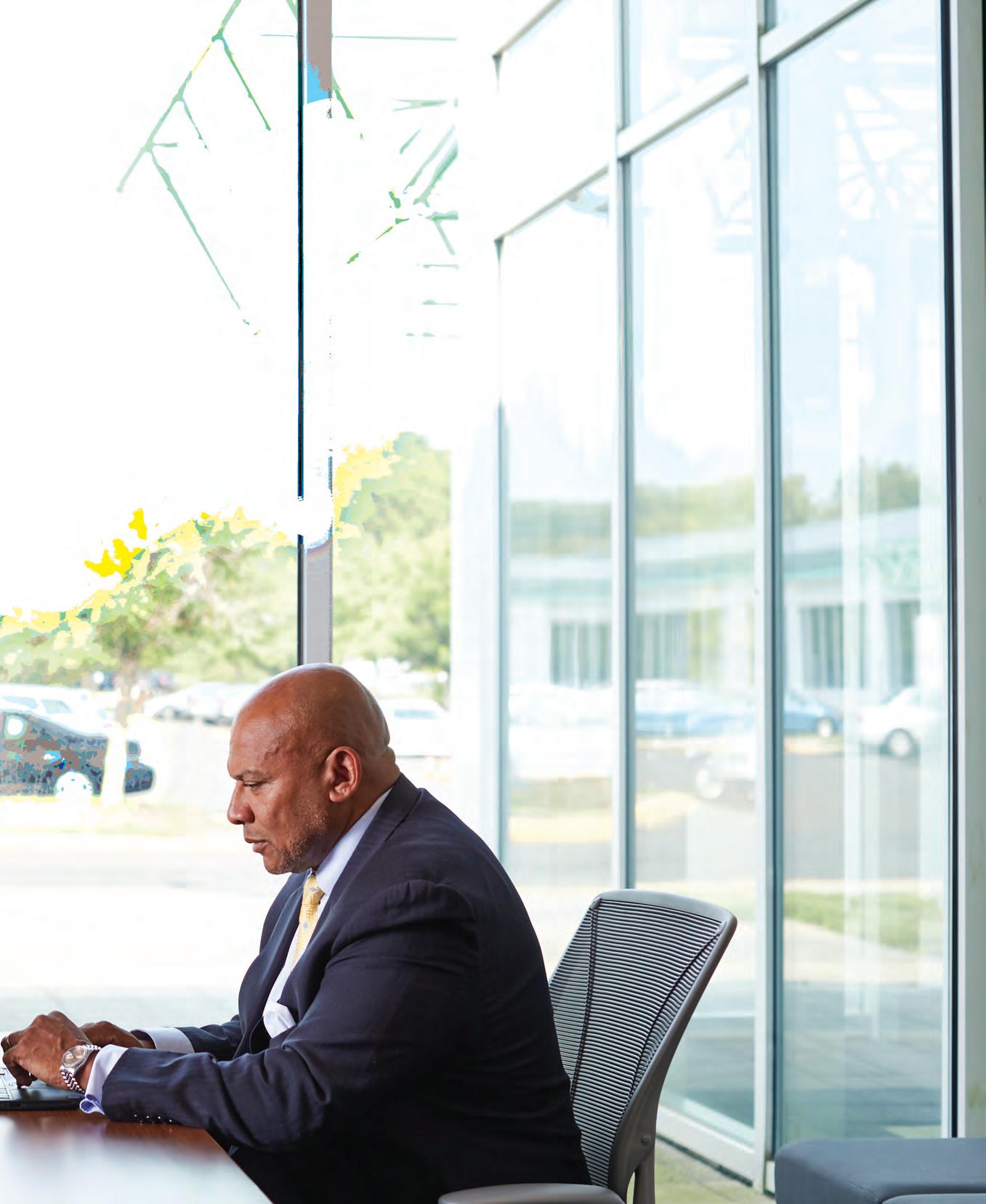
24 minute read
A Century of Stories
The New Haven Division of Northeastern University. New Haven Preparatory School. New Haven YMCA Junior College. New Haven College. The University of New Haven.
The evolution of this institution’s identity, from 1920 through present day, is as layered as the publications which archive nearly a century’s worth of our stories. What began as a collection of course catalogues and bulletins grew to independent reviews and newsletters, studentproduced content, contemporary alumni magazines, and yearbooks with attitude.
The sample of publications at right reveals the “faces” behind this journey as we envision the next 100 years at the University of New Haven — the challenges faced, new ideas generated, dreams delivered, and lives changed.
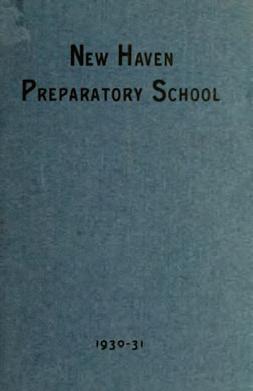

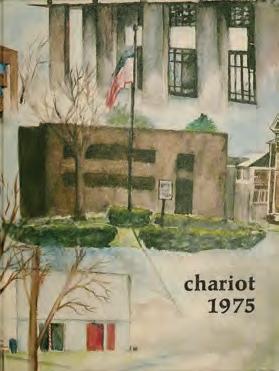







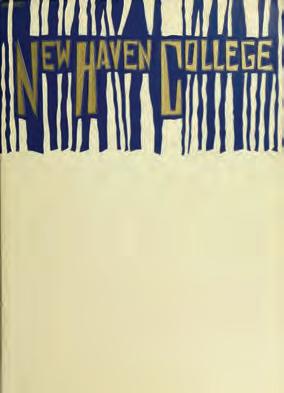
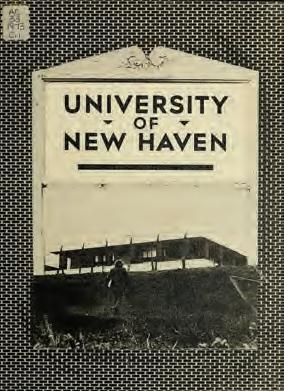


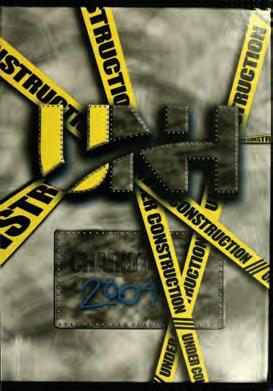
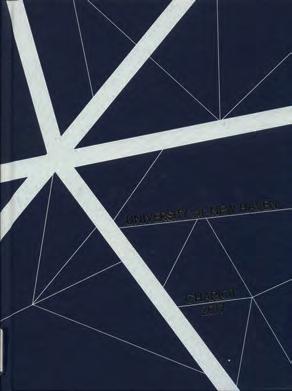
WE ARE FAMILY
WRITTEN BY CHRISTOPHER HANN

While the Chargers marching band has grown dramatically over the past decade, its devoted musicians — now 270 strong — have formed a powerful bond.
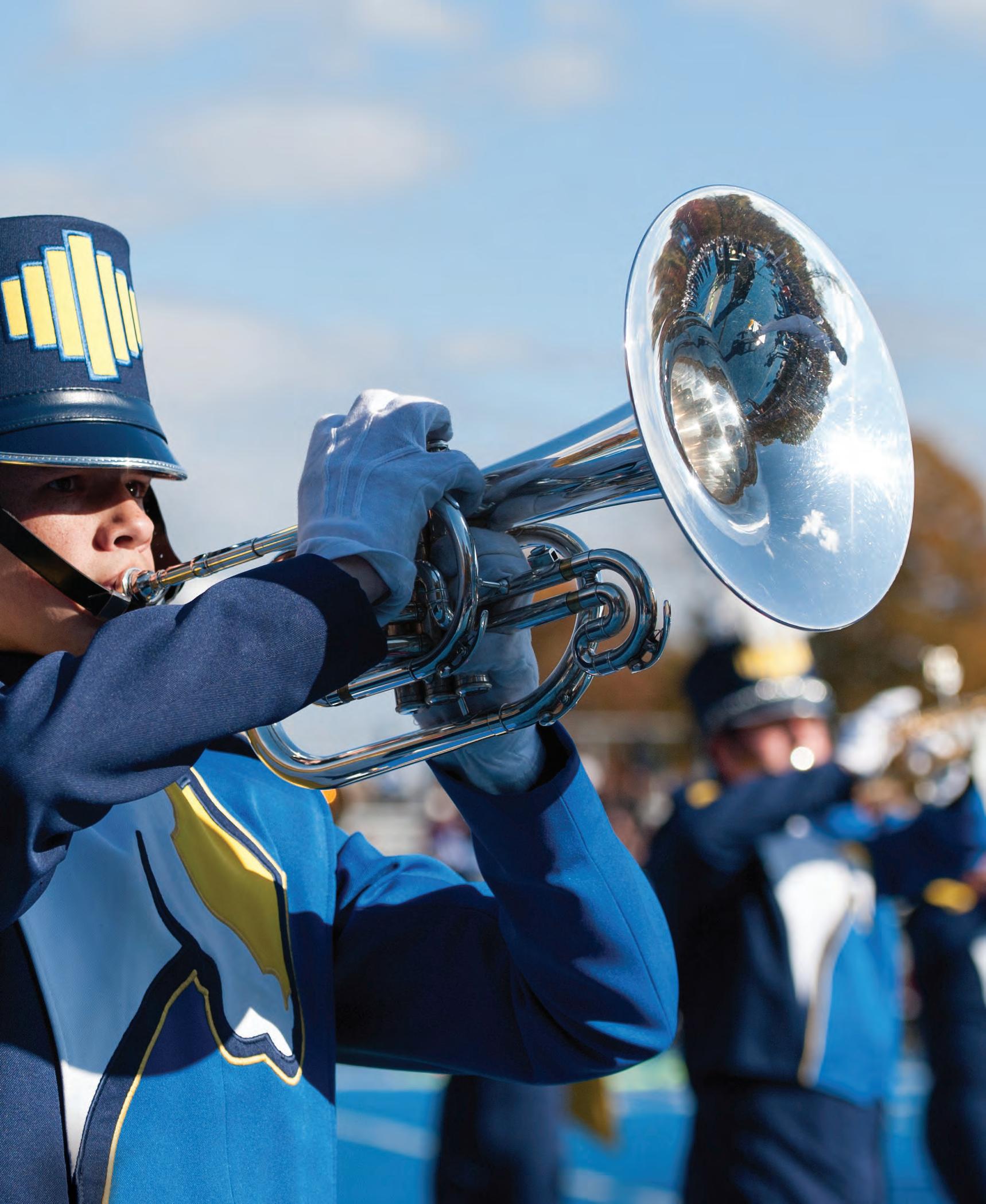


It’s a huge family there — a family in every sense of the word, Everybody really loves and supports each other.
IT didn’t take long for Elyse Stanziale ’22 to feel the love. It swept over her during marching band camp last summer. Over long days beneath a merciless August sun, she and the other members of the University’s vaunted band played and marched (and marched some more) as they learned the new music and drills for the coming season. Stanziale was learning to play a new instrument, the baritone horn. It was sweaty work, but she saw how every member of the band inspired every other member. She saw the love everywhere she looked, and she couldn’t get enough.
“It’s a huge family there — a family in every sense of the word,” says Stanziale, a music and sound recording major from New Jersey. “Everybody really loves and supports each other. There’s no
ELYSE STANZIALE ’22
BARITONE HORN way of avoiding the heat and being thirsty and holding up a really heavy instrument for a really long time. As much as I would complain about it, it’s so much fun, and I wouldn’t have it any other way.”
That family atmosphere has become a hallmark of a musical ensemble that has grown dramatically, in both size and stature, over the past decade. But it was not always so. When Jason DeGroff was hired as marching band director in 2009, the band had only recently been revived, following the return of the Chargers’ football program a year earlier. That first year, the band’s 20 members wore uniforms — and, in some cases, played instruments borrowed from local high schools. It was, to put it gently, a modest start.
DeGroff was undeterred. He recruited student musicians on campus and high school students during campus events and off-campus performances in festivals and exhibitions. After two years, the band topped 100 members. Three years later, it topped 200. And, when the band took the field before the first home football game of 2018 against Southern Connecticut State University on September 15, it numbered some 270, with members from Alaska and Texas, from Florida and Washington
State. One is from China, another from India. ››

As a six-year member of the band, Erin Snyder ’16, M.S. ’18 has enjoyed a front-row seat to its evolution. “More people coming to the University know about the band and how fast we’ve grown and how good we are,” she says. “It’s amazing.”
DeGroff chooses the music for each marching band season and writes all the drills — the choreography that directs each musician on when and where to march. For this year’s program — “with all the craziness in the world,” DeGroff says — he chose a selection of love songs, including Bob Marley’s “One Love” and Whitney Houston’s “I Wanna Dance With Somebody (Who Loves Me). ”
“He’s kind of like the father figure of the band,” Snyder says of DeGroff. “He’s the reason we are a family. He’s helped foster those relationships between the band members, and I think it’s awesome.”
The band’s annual summer camp is vital to its solidarity. Over 10 grueling days in August, band members begin thrice-daily rehearsals over the course of 13-hour days. Stanziale recalls staying up late each night during last year’s band camp in conversation with her bandmates. “I didn’t sleep all week,” she says.
Second-year graduate student Will Ciccone ’17, a percussionist and baritone horn player from New York, arrived at his first band camp with no prior marching band experience. “I saw how intense it was,” Ciccone recalls. “I was like, ‘Oh boy, I hope I can do this.’ Everyone around me said, ‘Don’t worry, everything will all make sense.’ And it ended up all making sense. They helped me adjust very quickly.” This season, for the second time, Ciccone is serving as drum major.
Each fall, the band rehearses for three hours on Mondays and Fridays, then another two hours on Saturdays before home football games. During those Saturday rehearsals, as many as 100 parents of band members prepare breakfast for the



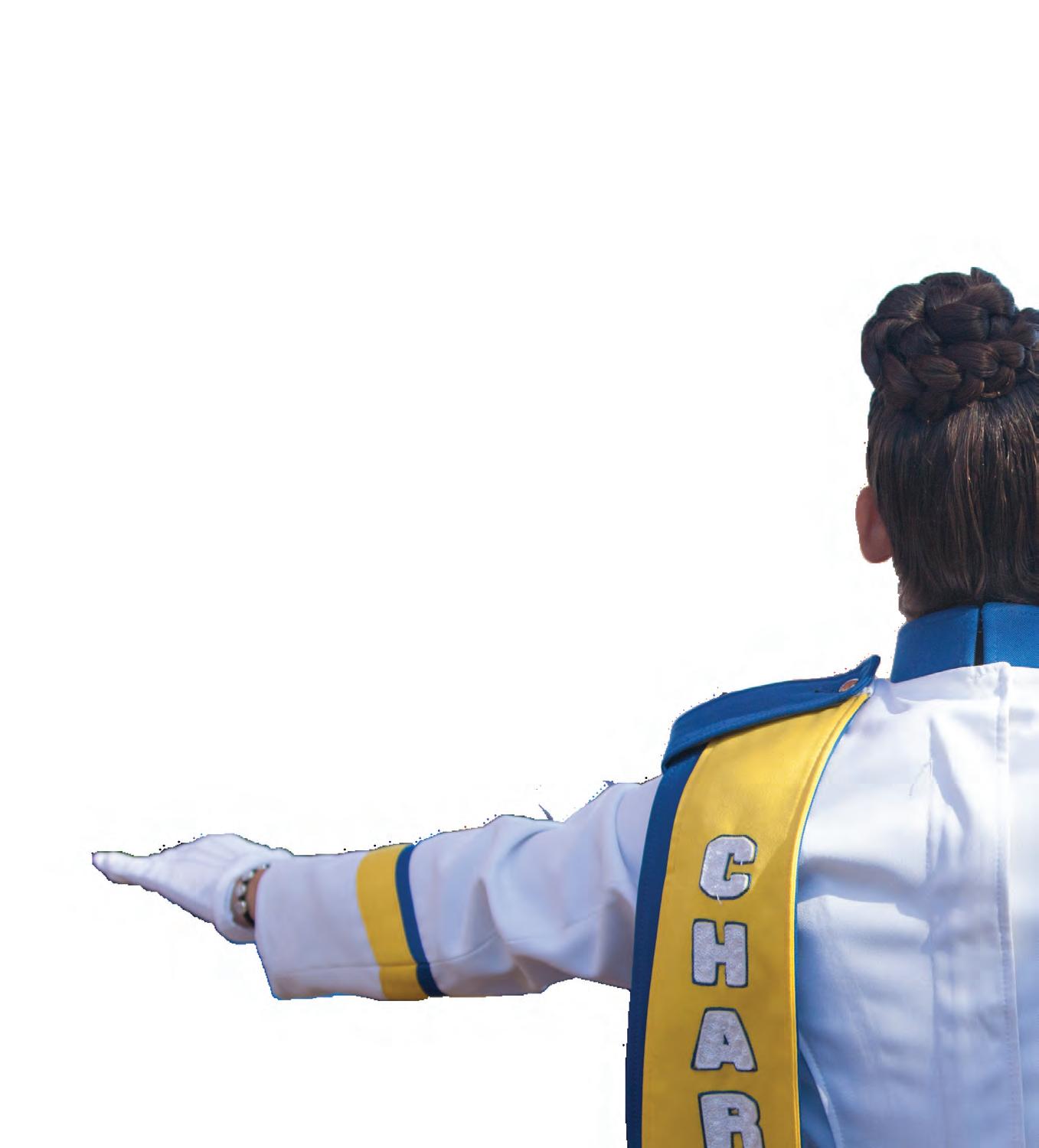


musicians — bacon, eggs, pancakes, home fries. DeGroff’s brother and sister-in-law, David and Lisa DeGroff, started the tradition five years ago when their son Thomas ’17 played baritone horn in the band.
DeGroff’s devotion to the musicians inspires their reciprocal loyalty to him and to each other. “When you’re out on the field,” says Phil Passante ’19, a trumpeter from Staten Island, New York, “and it’s so hot, and we’re all ready to pretty much drop dead, you still have that drop of motivation and positivity to finish up that phrase, to show Jason this band means as much to us as it does to him.”
In September, for the third straight year, the group performed at the Collegiate Marching Band Festival in Allentown, Pennsylvania, a showcase of 20 college bands attended by more than 6,000 spectators. In 2020, to mark the University’s centennial, DeGroff hopes to see the band march in the Thanksgiving Day Parade in New York City.
In 2016, the band created a campus chapter of Kappa Kappa Psi, the national, coeducational fraternity for college bands. Leah Myers ’18, a clarinetist from Connecticut (and a 2017 drum major), helped organize the chapter with tuba player Christopher Zygmunt ’17, the chapter’s founding president. Myers, a granddaughter of Samuel S. Bergami Jr. EMBA ’85, HON ’02, member of the University’s Board of Governors, and his wife Lois, says that the chapter, begun with 30 members, It was a no-brainer. I’m not today has nearly 50. The members organize ready to leave this program. fundraisers for the band, recruit prospective I want to see where it s going band members, and perform service projects the next two years.on campus. “When we became a chapter, we ERIN SNYDER ’16, M.S. ’18 hit the ground running,” MELLOPHONE Myers says.
Some students remain in the band even after graduating. Snyder was the first. A mellophone player from Pennsylvania, she was named one of three drum majors as a senior, then marched for two more years, including a second as drum major, while pursuing a master’s in forensic technology. “It was a no-brainer,” Snyder says of her decision to return. “I’m not ready to leave this program. I want to see where it’s going the next two years.”
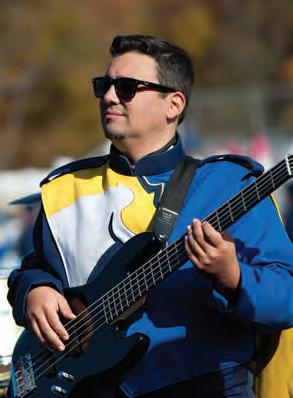

We Make It All Better
welcome to the schoolNew ^ of health sciences
These are the stories behind the University of New Haven’s newest school — one that prepares students not only for the healthcare careers in demand today, but for the healthcare opportunities of the future.
Written by Shannon Mullen and Elizabeth Rodgers Illustrations by Chris Gash and Joel Kimmel Photo by Defining Studios
IF BECOMING A SOLAR PHOTOVOLTAIC INSTALLER — the fastest-growing profession from 2016 to 2026, as projected by the U.S. Department of Labor’s Bureau of Labor Statistics — is not necessarily in your five-year plan, don't fret. You still have options.
Enter: Health Services.
Jobs in the Health Services field — medical assistant, nursing assistant, and home health aide, for example — are expected to grow 19% by 2024, faster than most other professions. By 2025, the U.S. healthcare system is expected to account for one fifth of the national economy.
In Connecticut, health-related careers are expected to be the third-largest occupational sector by 2024, with over 30,000 healthcare jobs expected to be added. Of those, 42.6% will be in south-central and southwest Connecticut.
Summer McGee, Ph.D., CPH foresaw greater opportunities in health services as far back as 2015, when she served as chair of the University of New Haven’s Department of Health Sciences. “I’m a builder,” Dr. McGee says. “I envision something incredible existing where before there was nothing. I’m constantly looking to shape or form or create something new that can stand the test of time.”
So McGee spearheaded the creation of the University’s newly established School of Health Sciences (SHS), which officially
SHS AT A GLANCE
12
Full-time faculty members
30+
Clinical faculty members
400+
opened for business this fall, with McGee as the founding dean. The University’s newest school is the culmination of nearly three years of collaboration and planning by more than 25 faculty members across all schools and colleges at the University. Their strategizing took place in a University-wide “virtual” department, the Department of Health Sciences, which existed outside of any single school or college and served as the home for the creation of new health-related degrees, research collaboration, and student support, among other services.
SHS comprises three University departments — Allied Health, Nutrition Sciences, and Health Administration and Policy — as well as the University’s programs in Dental Hygiene, Healthcare Administration, Health Sciences, Nutrition and Dietetics, and Paramedicine. There will be 12 full-time faculty members, more than 30 clinical faculty members, and more than 400 undergraduate and graduate students, in addition to doctoral candidates.
A nationally recognized expert in health policy, management, and bioethics, McGee joined the University of New Haven in 2013. She has also been recognized as a “Woman of Innovation” by the CT Technology Council’s 2017 Women of Innovation program. ››

SUMMER McGEE, PH.D., CPH
NEW DEAN
SCHOOL OF HEALTH SCIENCES
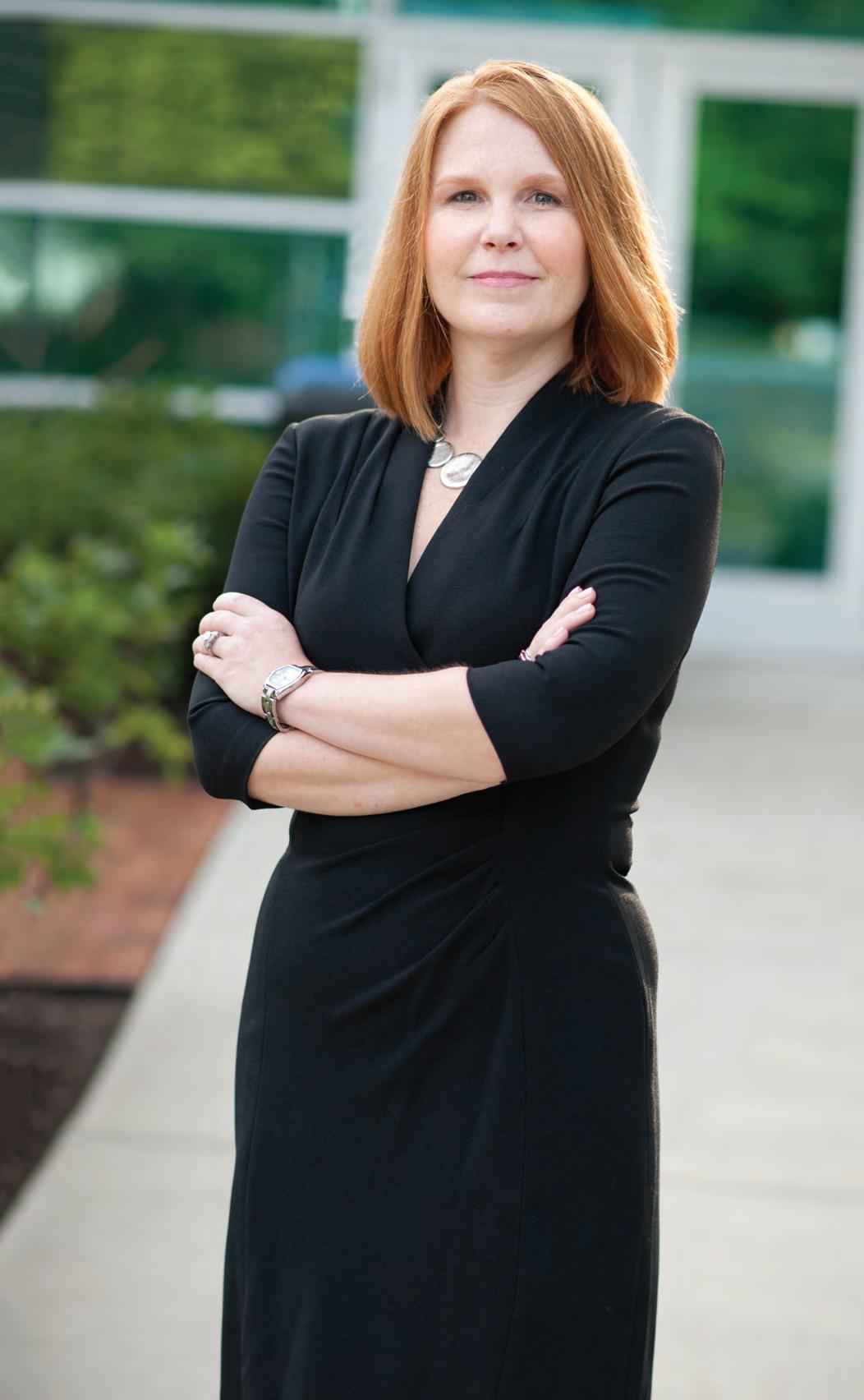
It was this creative will that helped her push through the more difficult phases of bringing the School of Health Sciences to life.
“The term innovation is more than a buzzword,” McGee says. “It’s a state of being. Challenges, whether social, organizational, or cultural, are opportunities for creation and growth. You need to flip the script and see solutions where, previously, others have only seen problems.”
This mindset has resulted in some lofty goals. McGee and the SHS faculty aim to build a robust core curriculum across all healthrelated programs at the University committed to inter-professional education; provide facilities and experiences that allow for real-world experiences; and grow health sciences program enrollments to 15% of the University’s total enrollment in five years (the equivalent of nearly 1,000 students). McGee notes that she aims for 90% of program graduates to be employed in the sector or enrolled in graduate programs within a year of graduating, and to attain a 100% board passage rate for licensed health programs.
“Creating SHS has been a leap of faith on the part of our students, faculty, and staff,” McGee says. “President Kaplan and the Board of Governors are counting on us to put the University of New Haven on the map for health professions education. And now, we’re here. And all we need to do is jump.”
Despite the chaos and complexity of bringing this dream to life, McGee keeps it simple.
“I can boil the mission and vision of SHS down to two words: growth and excellence,” she says. “The SHS faculty live and breathe this ideal. They don’t think: What do we currently have in front of us? They think: What are we missing? They are passionate about their discipline and wholly dedicated to their students.”
Renee Garcia-Prajer, R.D.H., M.S.
ASSISTANT DEAN
SCHOOL OF HEALTH SCIENCES
ASSOCIATE PROFESSOR
DEPARTMENT OF ALLIED HEALTH DENTAL HYGIENE PROGRAM
The Dental Hygiene program at the University of New Haven offers students two experiential internship opportunities — one working with the Navajo Nation in Arizona, and the other in Prato, Italy. Garcia-Prajer, who developed both RECOGNITION internships, says that BUCKNALL these roughly twoweek-long trips help EXCELLENCE IN TEACHING students hone their skills while also deepening their appreciation of different cultures.
There’s a significant need for dental services among the Navajos; students have full schedules throughout their stay providing preventive dental hygiene services, including the placement of pit and fissure sealants. In Prato, Tuscany’s second-largest city, students work with a local ambulance company, mentor first-year dental hygiene students at the University of Siena in the fundamentals of instrumentation, and assist in community and private dental practice settings.
Graduates are becoming dental hygiene program directors, oral health consultants, dental therapists, and even entrepreneurs. “A dental hygienist,” Garcia-Prajer says, “isn’t just someone who works for a dentist and cleans teeth. There’s so much more to it.”
faculty highlights
Here you will read just a few of a multitude of faculty stories that helped shape the vision for the future of health sciences at the University of New Haven.
Donald Stankus Jr., M.S., R.D.
LECTURER
NUTRITION & DIETETICS
Mary P. Griskewicz, M.S. ’95, FMISS
ADJUNCT
HEALTH ADMINISTRATION & POLICY
PRINCIPAL
SUMMER HILL ASSOCIATES, LLC
Peter J. Struble, M.P.A.
LECTURER, PARAMEDICINE COORDINATOR
DEPARTMENTS OF FIRE SCIENCE & PROFESSIONAL STUDIES AND ALLIED HEALTH
Stankus’ clinical work in the oncology department at St. Vincent’s Medical Center in Bridgeport, Connecticut, speaks volumes about the growing importance of registered dieticians.
In this role, he handles everything from intravenous feeding tubes to bimonthly cooking classes. In a new initiative, he’s helping to launch one of the country’s first “prehab” programs for liver and pancreatic cancer patients, working as part of a team to prepare them nutritionally, physically, and psychologically for surgery and radiation treatment. Having the Nutrition program in the School of INNOVATION HELPING LAUNCH ONE OF THE Health Sciences, COUNTRY’S FIRST he says, will make it easier to “PREHAB” PROGRAMS FOR LIVER AND PANCREATIC train students CANCER PATIENTS for these varied roles. One of the projects he’s working on at the University is setting up hospital-based nutrition assessment labs where students will work directly with patients, both from the University and the local community, on a regular basis.
“Students need to know how to make healthy meals that also taste good,” says Stankus. As a former personal chef, he’ll make sure of that. Digital health, which encompasses everything from the latest fitness apps to new blockchain technology dealing with storing and accessing patient health records, will be a critical area of focus in the School of Health Sciences’ curriculum.
Griskewicz, who earned her master’s in industrial relations, is a sought-after authority in the health sciences field, having held health information technology leadership roles with insurers Aetna, Cigna, General Electric, New Haven’s Hospital EXPERIENCE of Saint Raphael, and the Healthcare LOBBYIST FOR GE AND HIMSS Information and Management Systems Society.
As a lobbyist for GE and HIMSS, Griskewicz helped secure billions of dollars in federal funding to promote the U.S. healthcare system’s transition to portable electronic health records, an enormous logistical and policy challenge that’s still very much a work in progress. “We’re still not there yet,” Griskewicz says, “but there’s new innovations coming out every single day.”
In June, Griskewicz launched Summer Hill Associates, a consulting firm based in Madison, Connecticut, focused on patient advocacy and patient-centered IT strategies. As Struble explains it, the looming “silver tsunami” of aging Baby Boomers is going to make it increasingly difficult to get a hospital bed. As a result, paramedics will need to be equipped to manage cases in the field, so patients who don’t truly need to be seen in the emergency room can stay where they are or get care elsewhere.
It’s a concept called “integrated mobile healthcare,” and it will require major changes in the way paramedics are trained.
The Paramedicine program Struble helped spearhead six years ago at the University of New Haven is well positioned to meet this challenge. It’s one of only a handful in the United States that offers a four-year baccalaureate degree. He believes that moving formally in 2019 to the School of Health Sciences will only make the program EXPERIENCE stronger. SPENT 13 YEARS In Struble’s day, paramedics AS FIRE CHIEF IN WALLINGFORD, CONN. didn’t need a college degree, but that’s where the profession is headed.
Rachael A. Petitti, Ph.D., LCSW
LECTURER
DEPARTMENT OF HEALTH ADMINISTRATION AND POLICY
UNDERGRADUATE PROGRAM DIRECTOR AND FACULTY ADVISOR
HEALTH SCIENCES
It’s a deeply troubling statistic: People with serious mental illnesses live 25 years less, on average, than the general population.
What’s shortening their lives so dramatically? “They don’t go to the doctor,” Dr. Petitti says. The reasons for this, she explains, include poverty, health insurance issues, EXPERIENCE the debilitating effects of mental FORMER DIRECTOR OF MENTAL HEALTH TREATMENT illnesses such SERVICES IN NEW as schizophrenia YORK CITY and depression, and a shortage of primary care physicians.
A former director of mental health treatment services for the New York City Department of Health and Mental Hygiene, who also has extensive experience as a consultant and top executive in the private nonprofit sector, Petitti is a leading authority on integrative programs that aim to address this public health crisis by combining primary medical care with behavioral treatment.
There’s a global dimension to her research: In addition to assessing the impact of recent federal funding cuts on integrative programs in the United States, she’s also looking at how other countries handle these same types of behavioral health challenges in terms of service delivery models for this specialized group.
ALUMNI SPOTLIGHT
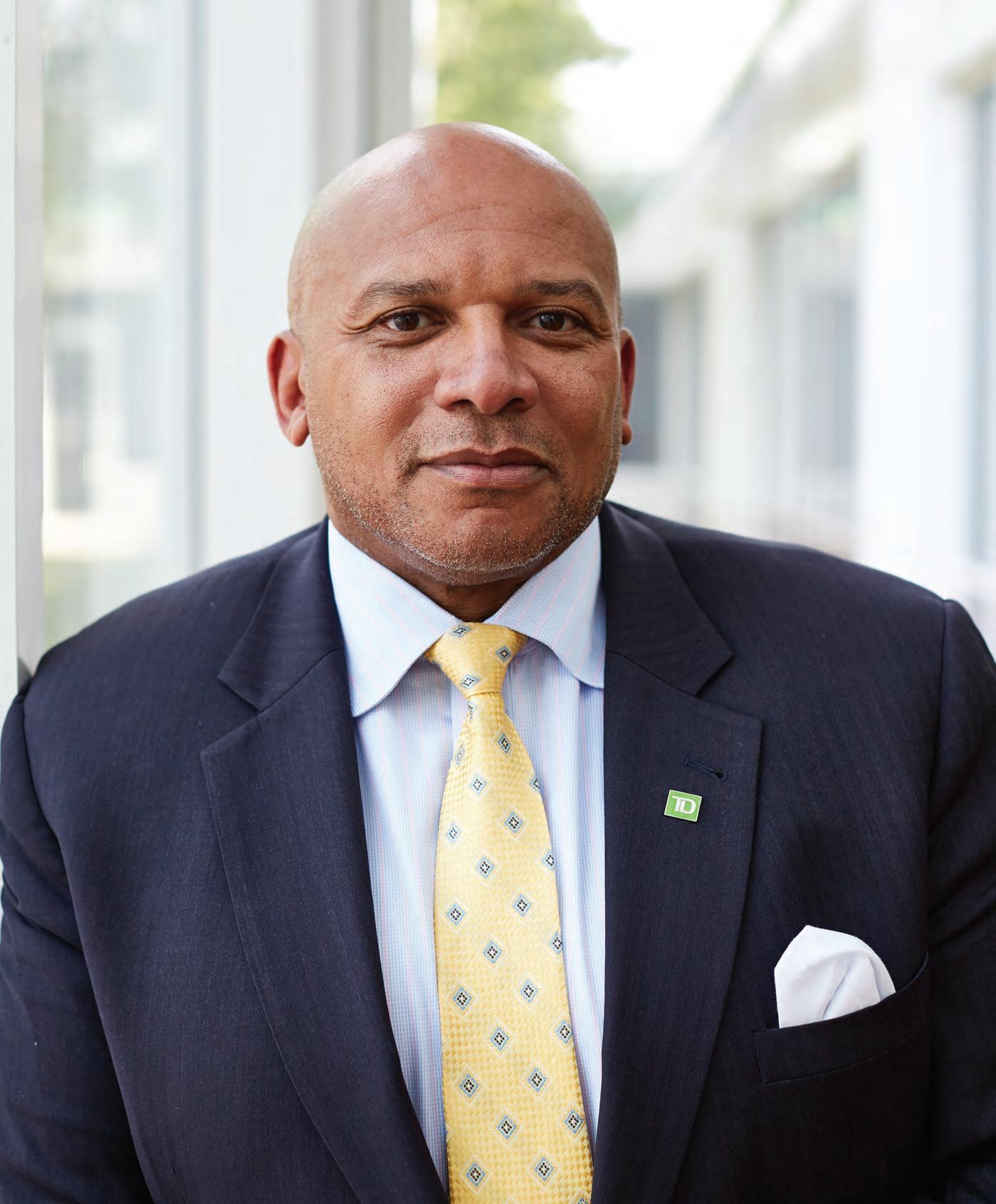
WRITTEN BY JOHN T. WARD PHOTOGRAPHY BY WILL FIGG
ALLEN LOVE JR.’S (’88, MPA ’90) FIRST JOB OUT OF THE UNIVERSITY OF NEW HAVEN WAS BEHIND BARS.
Just 22 years old and with a bachelor’s degree in Economics, Love was put in charge of a $12 million commissary budget at the Bridgeport Correctional Facility in Bridgeport, Connecticut, responsible for ordering inventory and authorizing payments. It was here that he discovered he had a felonious bent. The scant oversight he experienced in his role got him thinking how easy it might be to defraud the state of Connecticut by creating a fictitious vendor.
“I’m not saying that I’m a criminal. I did realize, however, that I had the propensity to think like a criminal,” he says now, with a laugh.
Love can joke because thinking like a criminal has served him well over the course of a 30-year career that has included undercover criminal investigations for the Criminal Investigation Division of the Internal Revenue Service, anti-money laundering (AML) work for PayPal, and his current job as Executive Vice President in charge of AML for TD Bank and Co-Head of Global AML for TD Bank Group.
A former captain of the Chargers football squad, Love earned a master’s degree in Public Administration in 1990. Today he serves on the University’s Board of Governors. He spoke recently about his work. ››
$2 TRILLION
GLOBAL MONEY LAUNDERING ESTIMATE PER YEAR
Give us a quick course on money laundering. Is it like the TV show Breaking Bad, where a husband-andwife criminal team finds themselves with a storage locker piled high with cash they can’t spend? Absolutely. One of my first IRS cases concerned an individual who was selling drugs up and down the East Coast. And you know what he did? He created a record label. He had one store, and that was his front. When we finally arrested him, we went to eight banks and pulled, collectively, one million dollars from all of the safe deposit boxes.
Money laundering is the end state of a crime that you committed for financial gain. So whether it’s fraud, or a Ponzi scheme, or tax evasion, you have to commit a crime, and then you have to take the proceeds of that crime and make them seem clean.
There are thousands of ways that people try to make their money seem clean. Some of these methods are very simple, and some are very complicated. The more complicated and convoluted, the more I love it.
A recent report estimated that, globally, $1 trillion to $2 trillion is laundered every year. Is it really at that scale? Easily. And that figure has been around for about the past 10 years, so it’s probably gone up a little bit. But yes, it’s in the trillions.

What’s your role in AML efforts? My primary responsibility is protecting the bank and its shareholders from being the victim of somebody laundering money or some type of terrorist financing occurring through our organization.
The secondary piece of it for me and a lot of people who get into this field is the civic duty to catch bad people. Under the USA Patriot Act, you’ve been deputized, whether you want to be or not, in the fight against money laundering and terrorist financing.
Do you actually undertake investigations or is it just a matter of noting suspicious activity and then handing it off to the government? Our job is to provide that information to law enforcement so they can do the investigation. But the reviews that we and other institutions do are quite detailed. When you file a suspicious activity report with law enforcement, you want to give them as much information as you can so they can pick up that narrative and run with it.
Depending on the day of the week, we are either the fifth or the seventh largest bank in the U.S., and I would say we have 300 employees who just do AML. Globally, where I co-head the program, we have over 600 people.
Does your background in economics play a strong role in what you do now? Yes. Economics gave me the discipline that’s needed to understand the complete picture, to take a macro or micro view of what’s going on in the world.
You mean you need to be able to see the totality of it before you can get into the granular aspects of it? Yes, because when I’m addressing issues, I’ve got to think strategically. I’ve got to think three, five, seven, 10 years down the road about the policies that I’m going to impact and how they affect the organization.
So, for example, a big thing now is the legalization of marijuana. TD’s a Canadian bank, and our parent organization is in Canada, but we have a large U.S. presence. In Canada, they’re going to legalize marijuana. But what’s the impact to the organization here in the U.S., where marijuana sales are against federal law and most state laws?
Then there are sanctions against countries like Iran, North Korea, and Cuba. TD in Canada can do transactions with Cuba, but TD in the U.S. can’t. You have to have very strong controls in place so that customers aren’t routing money through the U.S., because once somebody in the U.S. touches it, you’ve violated sanctions law.
Has cryptocurrency become a factor in your work? It has. The concern now is the anonymity. Because who’s on the other end of that transaction? From a money laundering and a fraud perspective, that’s the biggest concern. It’s just anonymous. There’s no central gatekeeper, so to speak.
KEY TERMS
MONEY LAUNDERING the act of concealing the transformation of profits from illegal activities and corruption into ostensibly “legitimate” assets.
USA PATRIOT ACT an Act of Congress signed into law by U.S. President George W. Bush. The Act allows federal officials greater authority in tracking and intercepting communications, both for purposes of law enforcement and foreign intelligence gathering.
CRYPTOCURRENCY a digital currency in which encryption techniques are used to regulate the generation of units of currency and verify the transfer of funds, operating independently of a central bank.
MACHINE LEARNING a field of computer science that uses statistical techniques to give computer systems the ability to “learn” with data, without being explicitly programmed.
Given the technology you have on hand or that’s in development — including machine learning and artificial intelligence — is it reasonable to expect that money laundering can be wiped out?
I want to be optimistic and say yes, but I don’t think it can. I believe that as long as there is human nature — greed, people wanting to take shortcuts, individuals looking to take advantage of others — we won’t be able to wipe it out completely. Can we do better? Absolutely. We do not do a good job of sharing information between the private sector and the public sector, and this is globally.
It seems that the challenge gets your blood going. [Laughs] It does. The challenge is, “Okay, how do they do that? What are they thinking about?”
You’ve been on the University’s Board of Governors since 2012. What perspective do you try to bring to this role? My perspective is, “What’s the discipline we need to make sure that we’re doing everything to educate the next generation?” We’ve got to educate the next generation so that when they graduate they have the experience to become productive citizens in society, not only from a working perspective, but also from a personal social perspective.
I think the experiences that I’ve had in my work life and in my personal life allow me to do that. Being an
African-American male also allows me to question what we’re doing from a diversity perspective, not only for our students, but also representation among the staff and professionals at the University. I also bring the perspective of having kids. I have a 20-year-old, an 18-year-old, a 16-year-old, and a 13-year-old.
You are a very generous person with your involvement with various not-for-profits. What is your philosophy on giving back? At TD, I chair our Diversity Leadership Team, where we’re asking, “Who are we admitting? What are we taking into account?” If you’re inclusive, you will be diverse.
I’m on the board of a foundation called Leave the Light On, which was started by childhood friends of mine. It’s a nonprofit that’s really looking out for caregivers and providing services to them so that they can make sure that they take care of themselves.
I also serve on the board of the Urban League of Philadelphia. I believe in their mission of economic empowerment, community support, financial literacy, and education.
What compels me to volunteer is a sense of duty. My life and the things that I have accomplished have been a blessing. So, when I give back — whether it’s participating in events, giving my time, or writing a check — I am fulfilling that sense of duty that I have inside of me as so many have done before me.
